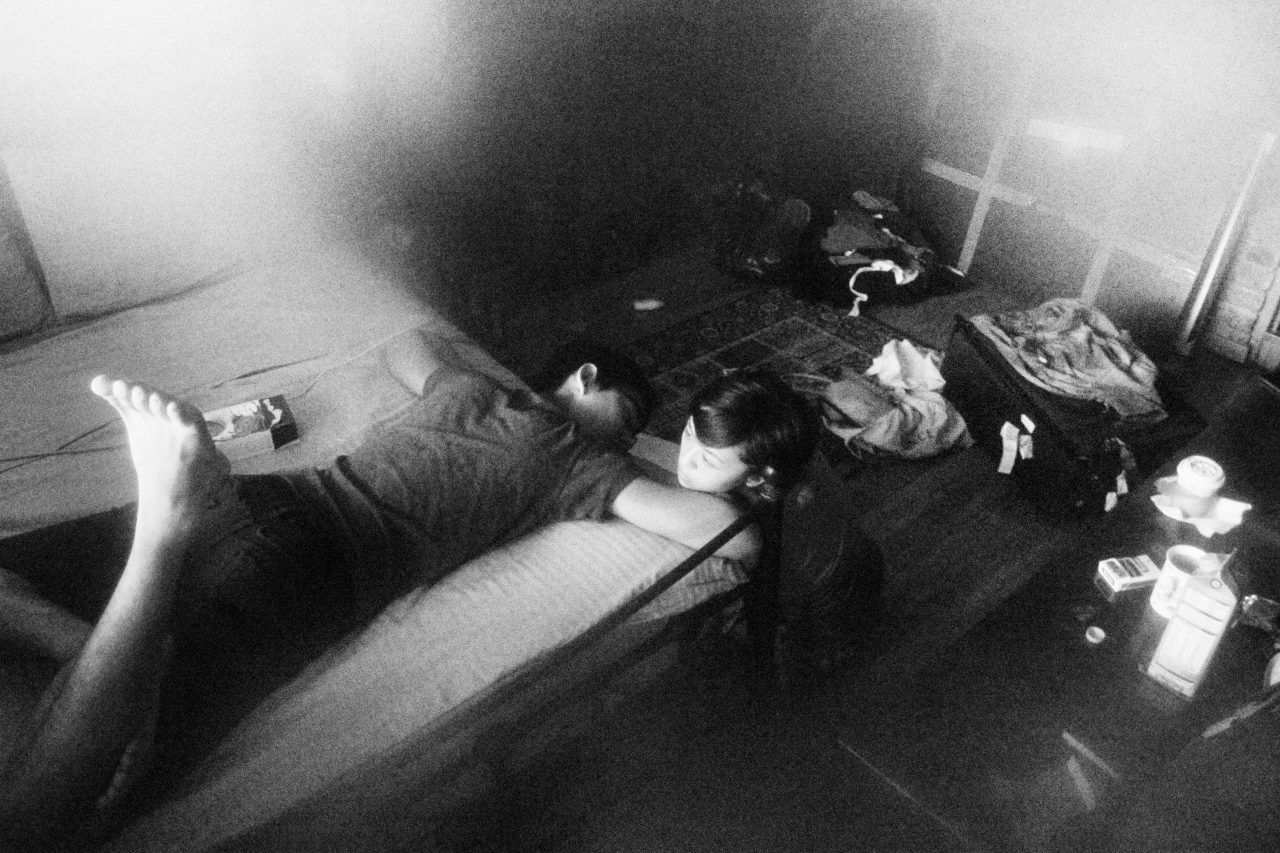Time passes. They talk; they get into fights; they develop murderous intent towards each other. Then Garcin has an epiphany: there are no torture instruments waiting them; their punishment is to spend eternity in a room together. He exclaims: “Hell is other people!”
The coronavirus has proved Sartre’s pronouncement accurate. Fracturing under the pressures of being confined in a limited space and spending literally all the hours in a day with each other, couples have found that they are in the mood for love no longer. To the glee of divorce lawyers, divorce rates have been soaring all across the world: in China, Saudi Arabia, Japan, and possibly America as well.
Singapore is no different. The law firm A. W. Law tells The Straits Times that it “has seen inquiries increase by 20 per cent during the circuit breaker”.
Ordinarily minor issues like “how or how often to buy groceries” would spark arguments because of the stresses of the circuit breaker, according to a psychotherapist quoted in the article.
More worryingly, “family violence has been on the rise since circuit breaker measures kicked in,” another ST article reports. “From April 7 to May 6, there … was a 22 per cent increase compared with the monthly average”.
Wanting to delve deeper into how and why romantic relationships in Singapore are splintering because of the circuit breaker, RICE commissioned independent research company Milieu to conduct a survey among people who are living with their partners.
In addition, yours truly became the ultimate kaypoh auntie and poked very deeply into the intimate lives of four couples living together: Kelly and Horace, an unmarried couple who are 24 and 27 respectively; Jennie and Ivan, a married American-Taiwanese couple in their 30s living in Singapore; Lynn, a 29-year old Singaporean recently married to Frank, a 30-year old American, both of whom are currently residing in New Jersey; and Priya and Naveen, 41 and 40 respectively, a Singaporean and an Indian national who have been together for almost 14 years.
(Aside from Jennie and Ivan, all the couples requested anonymity and have had their names changed to one of their choosing. So, no, I didn’t pick the name “Horace”.)
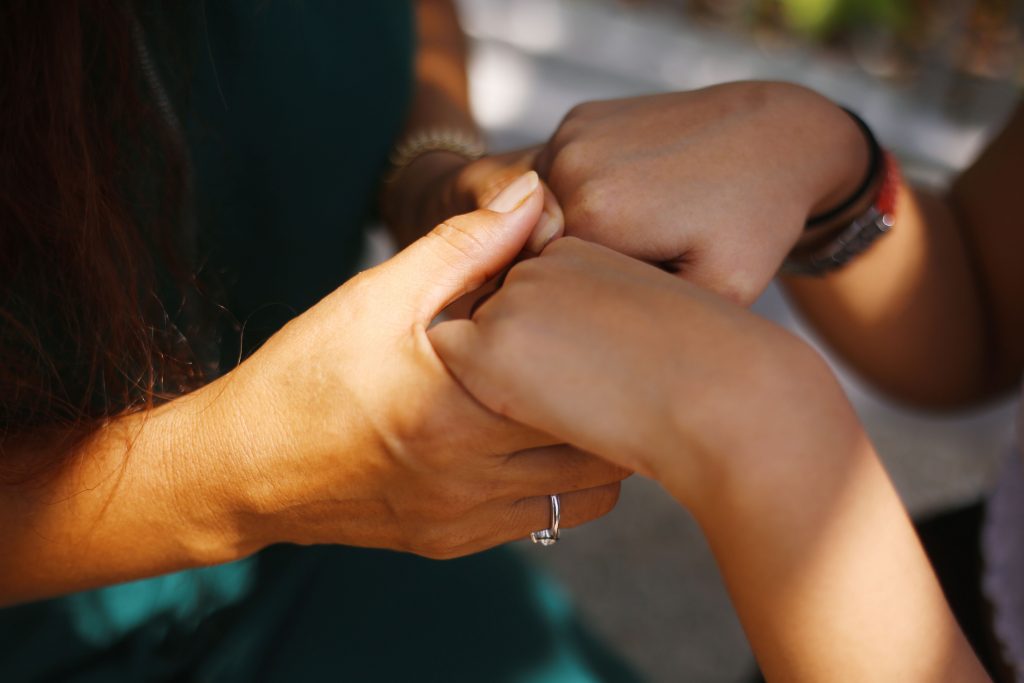
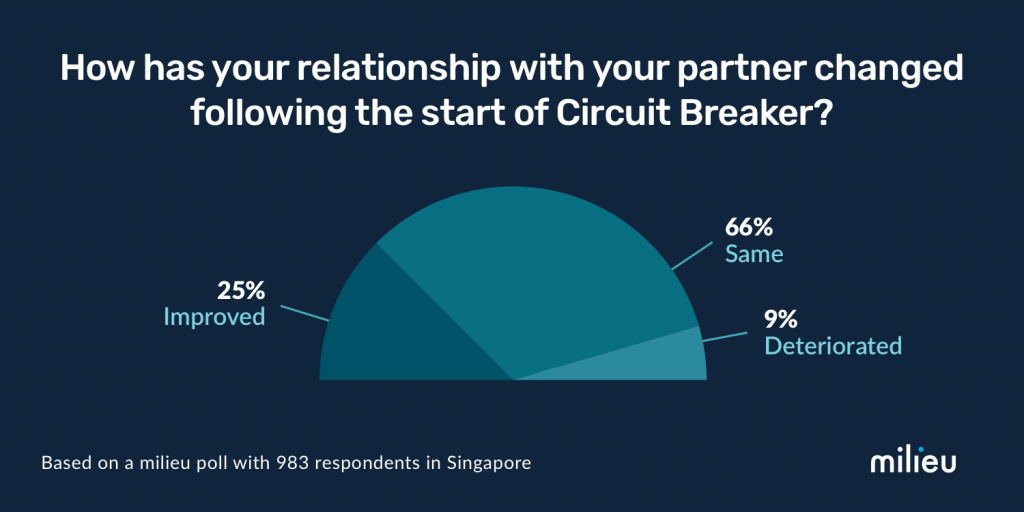
“My relationship has definitely improved,” Lynn tells me. “We talk a lot more about random things and find each other infinitely funnier.”
Then she immediately adds wryly: “Though I am not sure if that’s because we now have fewer bases for comparison.”
For Kelly, “nothing much has changed. Things feel pretty normal,” to which Horace, her partner, concurs: “I wouldn’t say we are closer, because we get along quite well already.”
Horace’s response reminds me that relationships staying the same during the circuit breaker is not necessarily a positive thing: an emotionally unhealthy relationship that stays the same during the circuit breaker is still an emotionally unhealthy relationship.
Yet, overwhelmingly, 81% of the survey respondents affirmed that going through the circuit breaker as a couple was a good thing for their relationship, suggesting that, for most, keeping the status quo should be seen as a positive, i.e. a happy relationship remaining happy.
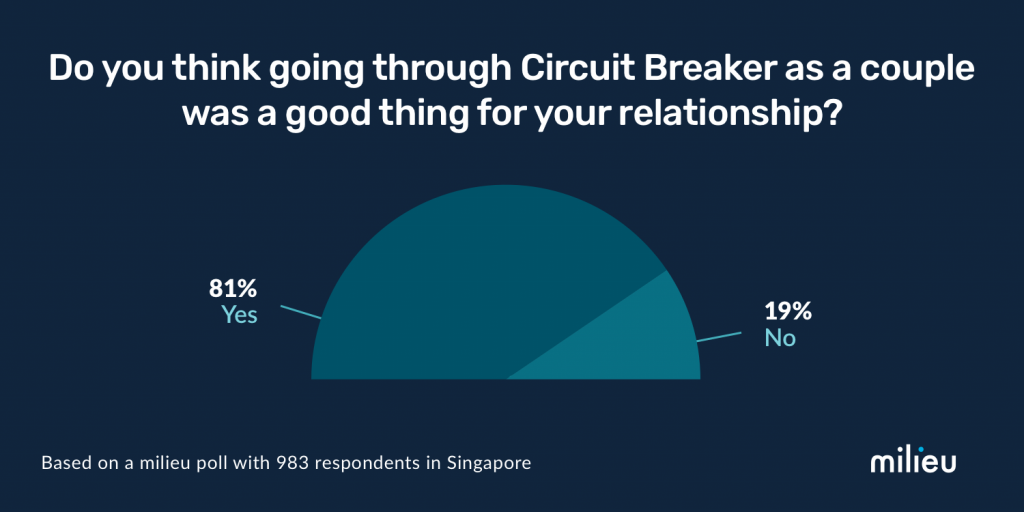
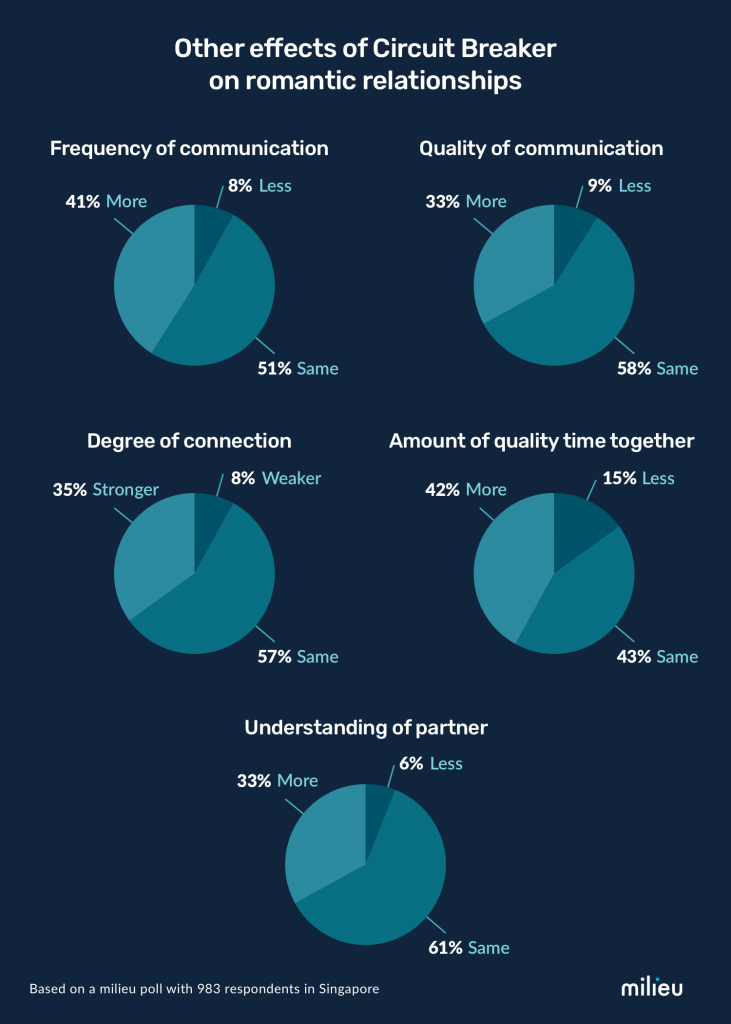
It may seem counterintuitive, but carving out your own space and setting boundaries, especially during work hours, is one of the most important things you can do to feel close to your partner. Doing so allows you to retain your identity and meet your partner as a fully formed person ready to make magic, rather than melding into an unsexy, shapeless jellyfish, with another.
Priya describes this push-pull tension as such: “All relationships thrive in the dance of pulling apart and coming together. Distance and proximity. Missing someone and feeling satiated.”
Thus, when the circuit breaker came into effect, she and her partner made sure she “had a decent office space to do [her] work, a personal bubble … [of her] privacy and personal space”.
This time apart from her partner, Priya explains, “catalyses intimacy and excitement about time together later on”, even if, spatially, they are separated only by a wall and less than two metres away from each other.
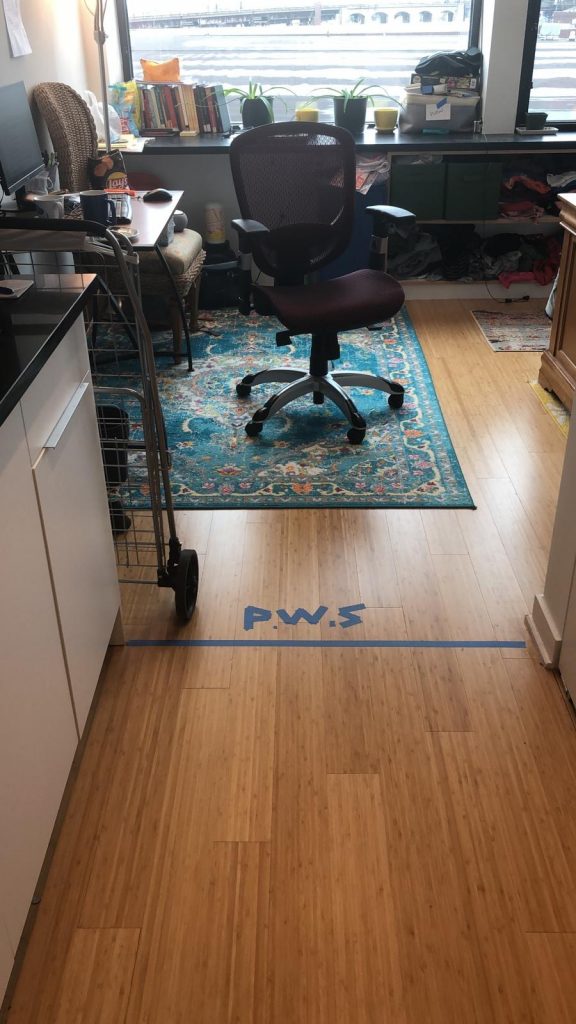
“He likes to talk to me about the colleague he just chatted with. And I hate talking during work hours!”
Eventually, they taped a line down the middle of their apartment and demarcated it into “her space” and “his space”. Moreover, at Lynn’s behest, any infractions are recorded on a yellow sheet and tallied at the end of the week. (“Yes, I am crazy,” she says.)
Such measures seem draconian, but they helped Lynn and Frank change their sheltering-in-place experience from “awful” to “gleeful”.
Of course, creating separate spaces doesn’t have to be so complex. For Jennie and Ivan, “this could mean one of us listening to music or watching Netflix with headphones in a corner or something,” after which they can reconnect with each other, fully recharged.
After this mandated space and time apart, what do most of these happy couples do when they emerge back into civilisation (location: home, population: 2)? Not baking—a superfluous activity that transforms fat and sugar into obesity and diabetes and wastes lots of electricity in the process—but its respectable older sibling, cooking.
“We used to go to the arcade for dates. Watch a movie. Go shopping. But now that everything is closed, there is no outlet to spend quality time together. It feels like a constant loop of working days,” Horace says. “So we started cooking together.”
“We’ve cooked carbonara, meatball subs, chye poh hor fun, apam balik, breakfast platters … All from scratch,” Kelly elaborates as she tempts me by showing me photographs of their very legit cooking. “Cooking is one of our highlights of the day.”
Horace nods: “We bond over cooking.”


Though he didn’t raise it as an example of bonding, making dumplings together is, to me—not to orientalise myself—the epitome of East Asian intimacy.
Indeed, when asked what they have learnt about their partner during the circuit breaker, answers related to cooking are among the most common: “she can cook”, reads one response; “he can cook”, retorts another; “cooking gets better and better”; “he cooks more”; “cooks well” … (In contrast, only one respondent replied “baking”.)
The frequency at which the topic of cooking crops up suggests that it is one of the more popular activities that happy couples have been doing while stuck at home.
When it’s nearing the time to stuff food into mouths, hunger mounts, work slows down, and couples instinctively succumb to the magnetic pull of the kitchen—and, more crucially, to each other. Moreover, despite its daily occurrence, cooking provides for infinite variety: you can cook chicken biryani one day and beef bourguignon the next … it’s hard to get bored. In fact, the more complex the dish, the better: cooking becomes more an interactive adventure than a rote, instrumental chore.
Regularity, interactivity, variety, consumption. The qualities that make cooking such an ideal activity for couples during the circuit breaker are found in another pursuit equally important to the health of romantic relationships under lockdown:
Somewhat unexpectedly, despite being restricted to home-based activities that only require a very small space, the frequency at which respondents were physically intimate with their partner was mostly the same as that during pre-circuit-breaker times. Only 24% reported an increase, while 15% a decrease.
This suggests that sex, contrary to its depiction in movies as a spontaneous bodice- or codpiece-ripping moment, is something planned. And most people’s schedules, it seems, have not changed during the circuit breaker.
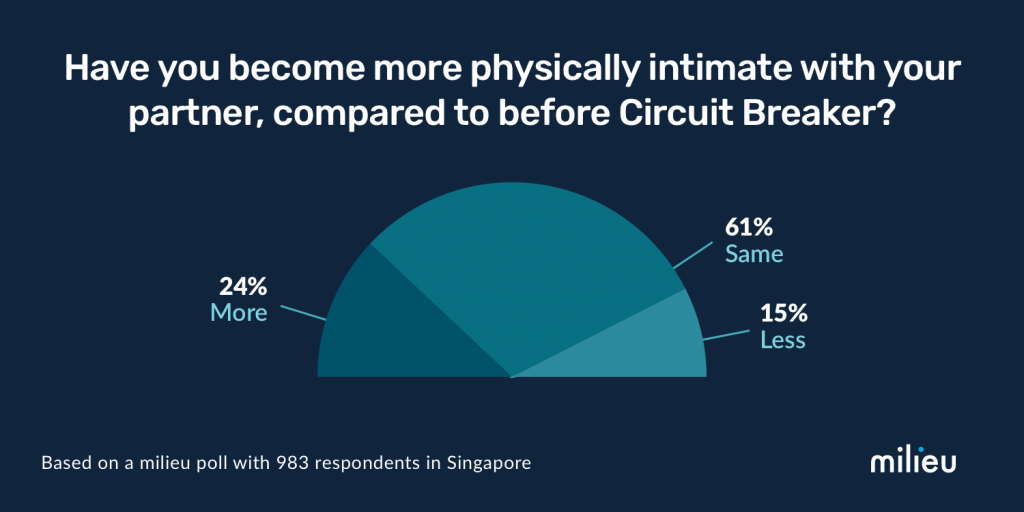
As Priya describes: “The idea that at the end of the day, you’re diving into bed and engaging in foreplay or sex is a nice thought, but often it just doesn’t happen! You’re too depleted to go there.”
Her answer to that? “Let’s schedule sex.”
To my surprise/relief (read into that what you will), all the couples I spoke to took the same approach.
“I mean, not to get TMI …” Ivan begins. I quickly reassure him no information is too much; he then laughs and admits, “We schedule sex at least once a week. Though sometimes there are bonuses during the weekday when one of us is in the mood and the other isn’t averse to it.”
The only exception to this rule is Horace, who claims: “My penis has eroded from 10 inches to 8.5 during the circuit breaker.” At that, Kelly rolls her eyes, and interrupts him: “There’s been no difference. We have a sex schedule. He’s super anal …” she pauses cheekily, and, after seeing my eyes widen, finally continues, “about his sleeping time, so we reserve these things for the weekends. On the weekdays—”
“She goes to the toilet for two hours,” Horace counters.
I chuckle awkwardly, but Kelly bursts into a full-throated laugh, telling me this sort of playful jibing was part of their relationship dynamic, and I relax in the affection they evidently have for each other.

Indeed, when surveyed about what they have learnt about their partners, many responded in a way that winked at better sex: “better not say”; “confidential”; “private”; “don’t want reveal”; “feeling more”. Of course, some were more upfront about it and laid bare the truth: “great kisser”; “good at sex”; “fark”.
Being in permanent close proximity with each other, then, seems to have influenced the way couples have sex or the effects sex has had on their relationship, even if its frequency was unaffected. Sex, in fact, seems a by-product of moments of intimacy, rather than a goal slavishly worked towards.
Even though Ivan and Jennie have “worked out a system,” Ivan clarifies that they do not exactly schedule sexy time. Instead, he says, it would be more accurate to term it “couple time. No-personal-laptop-or-phone time. When we just do something together. Which naturally leads to sex.”
“It’s not about the orgasm, or about coitus,” Priya reflects. “And I daresay, even without the pandemic and lockdown, intimacy is never really about just these ‘peak points’. It’s about touch, love, and presence.”
Priya’s thoughtful response reminds me that tracking statistics about sex is meaningless. It’s not about how much sex you have in a week (or day), the explosive power of your orgasm, or the exotic positions into which you contort your body in bed. It’s about how sex—or simply any form of physical intimacy—makes you feel emotionally connected to your partner.
Case in point: only 29% of the survey respondents claimed it was “more physical intimacy” during the circuit breaker that improved their relationship with their partner, whereas 62% attributed it “more quality time together”, and 58% to “supporting each other emotionally”.
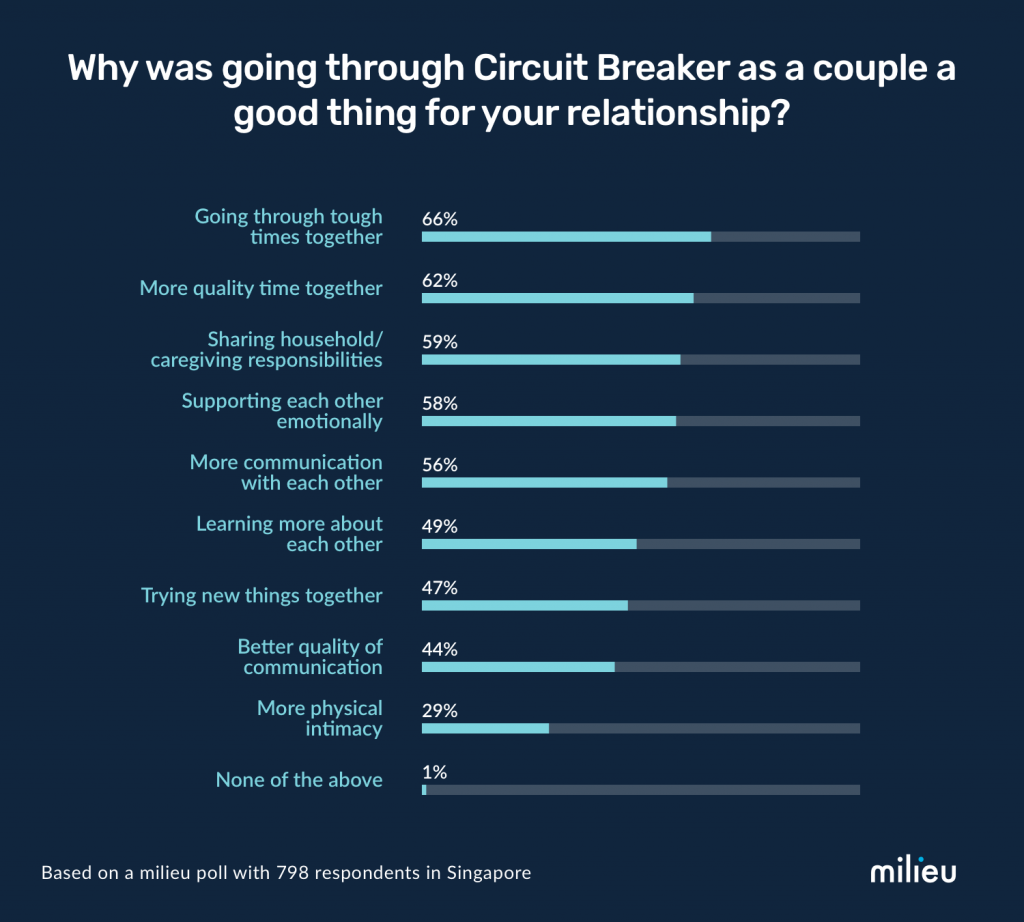
Communication between couples is a given necessity, so I won’t spend long harping on it. Circuit breaker or not, open and constant communication is key to a healthy relationship. As expected, the couples who thrived through the circuit breaker expressed that they have been communicating more and better, or at the same level, with their partners.
For those whose communication dynamic has not changed much, I suspect that it is because they already have a strong foundation, like Jennie and Ivan.
Prior to getting married, they were in a long distance relationship for six years. “For an LDR to be successful,” Ivan explains, “you really need to over-communicate everything. So during the CB, when one of us has an issue, it gets raised pretty quickly and directly. Neither of us likes to play games or keep anything in. Our rule is: ‘whatever emotion doesn’t get expressed, isn’t valid’”.
“For example, we do a lot of PDA. Just casually grab each other’s butt or something. Recently, she told me that she felt that wasn’t enough. She wanted me to say that I was attracted to her while I grabbed her butt. I was like ‘Oh. I thought the act of grabbing it showed that I was attracted to you.’ But she wanted me to verbalise it. So that’s the communication I was talking about. Very specific.”
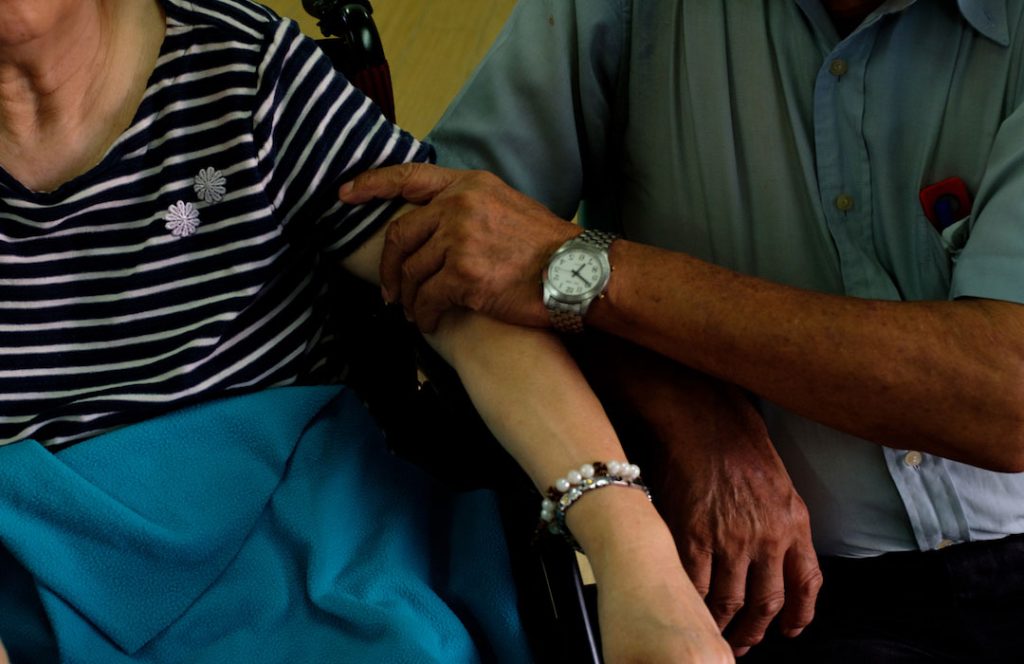
Kelly agrees: “Things are more out in the open now that we are in close proximity. Sometimes I don’t want to make my unhappiness a ‘thing’—Horace calls it a ‘thing’,” she elaborates, shooting a dirty look at him, as he responds by sticking out his tongue.
“Before the circuit breaker,” she continues, “we would talk a lot over Telegram. Then, I would hold my feelings in. But now that we’re already stuck together, I’m attempting to say more stuff in the open. I’d rather resolve issues now.”
Against all expectations, the circuit breaker seems to have improved the relationship of most live-in couples. Most. Not all. I must mention that the couples I interviewed are fortunate: as far as I know, all have kept their jobs, earn a comfortable income, are not discriminated against, and are not victims of domestic abuse.
Unlike them, vulnerable populations, like migrant wives or lower income couples will feel the stresses of the circuit breaker—whether romantic, financial, or psychological—more acutely. The circuit breaker might widen the fractures of their relationships instead of giving them an opportunity to figure things out and emerge stronger.
Still, I think it is worth celebrating the little victories, especially among a pandemic that has depressed much of the global population. For most, being trapped with their romantic partner through a global crisis has seen them navigate each other’s emotional terrain more sensitively; re-evaluate what intimacy and “couple time” means to them; learn how to communicate more effectively. All of which are unequivocally good things.
Furthermore, despite my pessimistic diagnosis above, this positive development does not seem not limited to the couples who already share the sort of pure love Michelle and Barack Obama have. Hell is other people, but so is heaven. The circuit breaker can also, like our kerbside grass bursting into wildflower, reveal unexpected beauty in places we never thought to look.
As one anonymous respondent in the survey wrote:
He actually loves me more than I thought.

